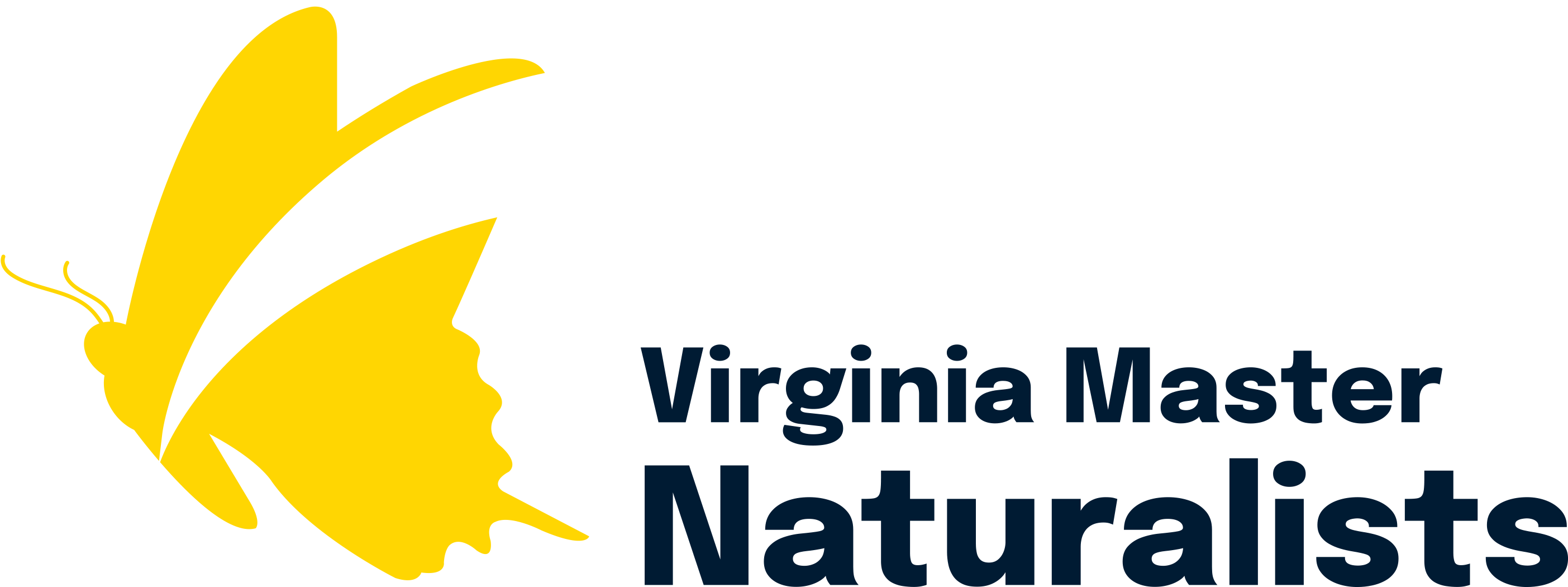Below, we present some of the 2023 data through a table of quantitative outputs and an impact statement that will be submitted to Virginia Cooperative Extension and other sponsors. To learn about more stories of volunteers and their projects, check out our 2023 VMN Program Awards announcement.
2023 Virginia Master Naturalists By the Numbers
|
|
2023
|
|
New Basic Training Graduates
|
516
|
|
Total Enrolled VMN Volunteers
|
3,345
|
|
VMN Volunteers Reporting Service Hours
|
2,682
|
|
Volunteers Certified or Re-certified for 2024
|
1,561
|
|
Continuing Education Hours
|
31,820
|
|
Service Hours: Education and Outreach
|
52,184 (by 1,630 volunteers)
|
|
Service Hours: Science
|
79,923 (by 1,907 volunteers)
|
|
Service Hours: Stewardship
|
60,870 (by 1,782 volunteers)
|
|
Service Hours: Chapter Leadership
|
42,281 (by 1,457 volunteers)
|
|
Total Service Hours
|
235,258
|
|
Monetary Value of Service
|
$7.67 M
|
|
Sites Improved Through Stewardship
|
697
|
|
Number of new habitat sites planted/restored
|
46
|
|
Number of Direct Educational Contacts Made
|
424,503
|
|
Number of Indirect Educational Contacts Made
|
305,230
|
|
Number of Citizen Science Studies Supported
|
60+
|
Relevance
Virginia faces difficult natural resource challenges, such as loss of forestland, impacts of invasive species, pollution of our waterways, and disconnection between people and nature. State and local natural resource agencies need help to address these challenges, and public engagement is critical to their success. At the same time, individual Virginians need opportunities to be actively involved in exploring, caring for, and observing nature in their local communities, both for their own health and wellbeing and for the health of our natural resources. Furthermore, because the most impactful experiences in nature are deeply social, opportunities to connect people with nature through social groups are needed.
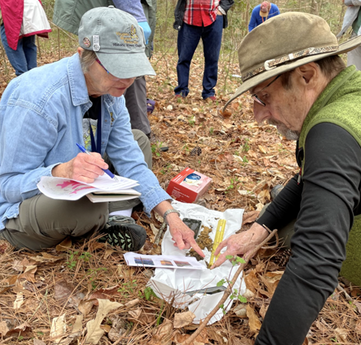 VMN volunteers spend time learning in the field in order to observe nature firsthand and practice their naturalist skills. Photo courtesy of Connie Reitz.
VMN volunteers spend time learning in the field in order to observe nature firsthand and practice their naturalist skills. Photo courtesy of Connie Reitz.
The Virginia Master Naturalist (VMN) program addresses these needs by supporting a statewide corps of volunteers providing education, outreach, and service dedicated to the beneficial management of natural resources and natural areas within their communities. With 30 chapters across Virginia, the program aims to extend the capacities of state and local natural resource organizations to achieve their missions in new ways, engage new audiences, and work towards creating a citizenry more informed about and involved in natural resource conservation and management. The program, because of its chapter-based structure, also promotes learning about, exploring, and stewarding natural areas through social groups.
In 2023, the program grew to 3,345 enrolled volunteers. VMN chapters offered 30 basic training courses, resulting in 516 newly trained volunteers joining the ranks. Together, VMN volunteers reported more than 235,000 hours of service in Virginia, valued at $7.6 million. More than 1,500 volunteers earned the Certified Virginia Master Naturalist title by completing at least 40 hours of service and 8 hours of continuing education. Since the program’s inception in 2005, more than 7,000 individuals have become trained VMN volunteers, and those volunteers have contributed more than two million hours of service with a value of $57 million to the Commonwealth of Virginia.
Volunteer service hours were completed in four primary areas: education and outreach (52,184 hours; $1.70 million value), stewardship (60,870 hours at more than 600 sites, $1.98 million value), citizen and community science (79,923 hours, $2.60 million), and chapter leadership (42,281 hours, $1.38 million). VMN volunteer contributions in each of these areas resulted in positive impacts, such as restored habitats, new data for use in wildlife and land management, and more Virginians getting connected to nature.
Two noteworthy areas in which VMN volunteers made a difference in 2023 were promoting natural habitats and facilitating opportunities for Virginians to experience and learn about nature.
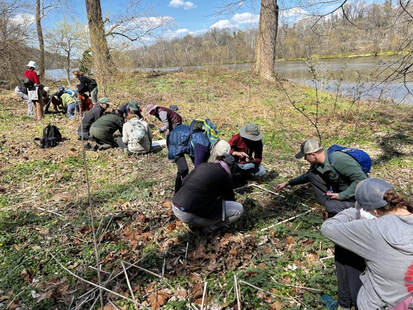 Lower Potomac Gorge Ecosystem Monitoring – Volunteers are using a 1-meter square quadrat and placing it according to strict rules in a random fashion so the results can be generalized. By doing so, ARMN and the NPS will be observing the changes in vegetation that occur after invasive removal and learning about techniques that work or do not work in the process. Photo by Joy Tobin.
Lower Potomac Gorge Ecosystem Monitoring – Volunteers are using a 1-meter square quadrat and placing it according to strict rules in a random fashion so the results can be generalized. By doing so, ARMN and the NPS will be observing the changes in vegetation that occur after invasive removal and learning about techniques that work or do not work in the process. Photo by Joy Tobin.
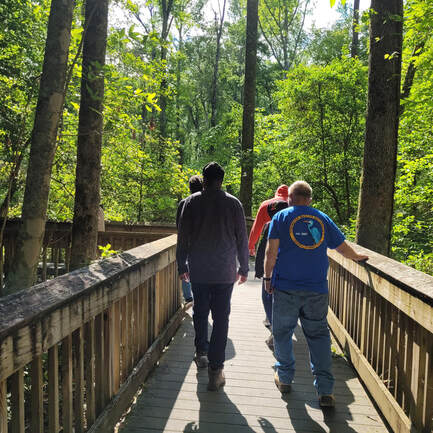 Virginia Master Naturalists in the Tidewater Chapter lead local community members on a nature and history walk at Great Dismal Swamp National Wildlife Refuge. Photo provided by Beth Deir.
Virginia Master Naturalists in the Tidewater Chapter lead local community members on a nature and history walk at Great Dismal Swamp National Wildlife Refuge. Photo provided by Beth Deir.
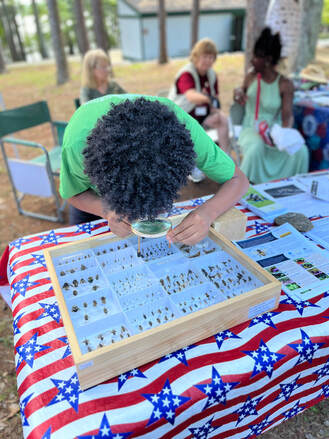 Southern Piedmont Master Naturalists partnered with Occoneechee State Park for a ‘Pollinators in the Park’ event, offering a chance for visitors of all ages to learn about the importance of bees, butterflies, and other pollinator species.
Southern Piedmont Master Naturalists partnered with Occoneechee State Park for a ‘Pollinators in the Park’ event, offering a chance for visitors of all ages to learn about the importance of bees, butterflies, and other pollinator species.
